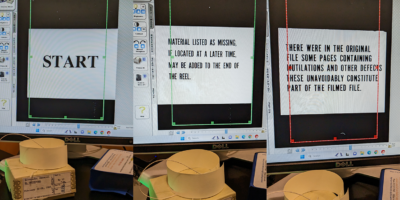By Luis Henao Uribe
This is the first of two posts where I develop some of the ideas presented at the “Reinventing critical interculturalism: Cultures and languages in the classroom” event, as part of The Futures Initiative series The University Worth Fighting For. In the first half of this post, I describe my research; in the second half, I reflect on how the issues I study in literature and history shape my classroom and pedagogy.
One of the benefits of being a graduate student at CUNY, and part of the Humanities Alliance, was the opportunity to present my research in the Latin American literature class that I taught at LaGuardia Community College. As a student at the Latin American, Iberian, and Latino Cultures (LAILAC), at the Graduate Center, I focused on literary and political representation, particularly in Colombia.
The relationship between language and power has defined the terms of political participation in many instances of Colombia’s history. In my research in the field of Latin American literature, I investigate the role between language and social visibility. Gilberto Loaiza Cano traces the origin of Colombian citizenship to the public speeches of criollos intellectuals (Latin Americans of full Spanish descent) during Independence. The Republic established at the beginning of the nineteenth century was founded by the emergence of an intellectual and lettered class that uttered publicly their differences from the institutional and symbolic system generated from Spain. They claimed to be “nosotros” – or “we”- in a similar fashion as the “We the people” that opens the Preamble to the United States Constitution. Those “nosotros” were able to guide and narrate the political shifts that followed the Spaniard crisis of 1808, and ultimately to govern society. Through public speeches, booklets and newspapers, criollos claimed to be the legitimate voice of the people. By presenting themselves as “nosotros,” they became a ruling class, founded in their capacity to speak, to narrate and to write, in representation of a pueblo that didn’t have that same capacity or didn’t speak the same language variety.
A great deal of the debates about power in Colombia during the nineteenth and twentieth centuries was tightly linked to the use of language. As in many countries, literacy itself was a condition for Colombian citizenship. Until the first half of the twentieth century, there was a proficiency requirement to be able to cast a vote. During the same period, five grammarians held the presidency, known as “los presidentes gramáticos.” They were concerned with language, and they wrote extensively about its usage. The rule of law and the rule of language were part of the same political arena. The eloquent use of language, or a certain variety of language, was a tool for social distinction, to differentiate a class from others. This was maintained by limited access to education. An uneven educational system reproduces social inequality because it controls access to the means of representation (political and literary).
I have worked with a novel called El día del odio (1953), by Colombian author José Antonio Osorio Lizarazo. Its characters are campesinos who moved to the city, prostitutes and thieves. All of them were abandoned by the State, marginalized by society and disciplined or pursued by the police. Every time these characters try to speak, they aren’t able to do so; they are never able to communicate with power. Every time that they have to explain themselves to a judge or a police person, they are never understood. Their dialect is not socially valid or not recognized as so.
Integrating these questions to my Latin American literature course caused me to reflect on my teaching practices. If my disciplinary research shows language as a factor of exclusion, allowing for lack of representation or an unfair representation, what is the role that language plays in my classroom? In my first semester at LaGuardia, I began paying a lot of attention to those students who weren’t participating, who weren’t speaking.
I stopped thinking about those “silent” subjects as “unable to speak” and started observing those who are “unable to understand,” such as policemen and judges in El día del odio. We shouldn’t assess participation and engagement solely based on the ability or comfort to speak standard academic English, or standard academic Spanish. Instead, I started to place the deficit in the system, at an institutional level. The issue is not that the student is unable to speak, but rather the institution is not designed to understand.
I grew aware of how we value proficiency and eloquence in academia; sometimes, implicitly, we reward those who speak the way we do, that are proficient in the codes and conventions that we use. Sometimes there are built-in-penalties for those who communicate differently than us because they didn’t have a specific training. Language is infused in our means to assess knowledge production and engagement. It is necessary to think about the kind of support we offer students to become proficient in the modes of academic life, but also it is so to reframe the paradigm of language value and to create avenues of participation that don’t rely solely on students’ proficiency with the language.
Luis Henao Uribe is a Postdoctoral Fellow at the TLC and a graduate of the Ph.D. program in Latin American, Iberian, and Latino Cultures at The Graduate Center, CUNY. He has taught language classes at CUNY, most recently at LaGuardia Community College as part of the Mellon Humanities Alliance.










Leave a Reply